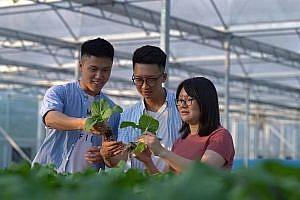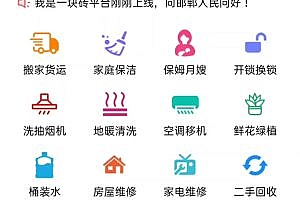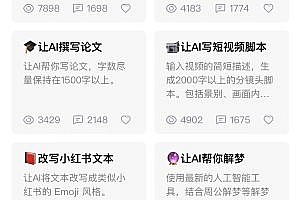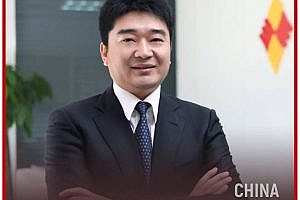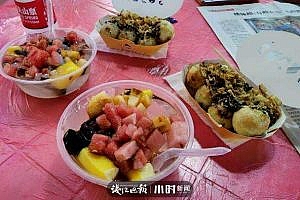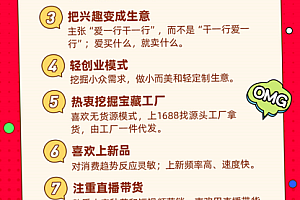
↑
Entrepreneurial trio: (from left) Luo Weite, Liang Lifeng, Tan Huimin
Red Star News reporter | Zhou Weihao
Editor | Guan Li Peng Jiang
As the season approaches, Liang Lifeng’s workload has increased again. Starting from morning, he spent the whole day soaking in the greenhouse, carefully checking the disinfection of the cultivation system inside, and preparing for a new round of seedling planting.
In 2016, he teamed up with two high school classmates and went from Hong Kong to start a business in Jiangmen, Guangdong. The entrepreneurial project was Fish and Vegetable Symbiosis.
Over the course of six years, three college students who had stepped out of school and plunged into the field of agriculture used their own “stupid” methods to explore their own experiences and models, from how to expand planting scale, to creating their own technology patents for cooling, filtration, etc., to the entire chain that runs through the primary, secondary, and tertiary industries based on fish and vegetable symbiosis.
With the support of governments and enterprises in many parts of Guangdong Province, these three young people who came out with only 2000 yuan of New Year’s money each not only achieved success in their careers, but also inspired more young people from Hong Kong and Macao to understand and root in the mainland. From Jiangmen to Hong Kong, baskets of fresh vegetables serve as a bridge connecting young people from both places.
Taking the first step with free greenhouses and dormitories
As the “technical leader” of the team, Liang Lifeng’s understanding of agriculture was actually very limited before starting his own business.
In 2014, he participated in a rooftop farm project at the Hong Kong Polytechnic University, where he was exposed to fish and vegetable symbiosis technology. Liang Lifeng still remembers that his original intention at that time was just to have fun. Due to limited space in the school building, the rooftop farm is only a few square meters in size and the technology is not mature. “It cannot be seen that it is in the shape of a vegetable, completely different from what we usually see in the vegetable market
Luo Weite and Tan Huimin are high school classmates of Liang Lifeng. Three people have been participating in environmental protection activities together since middle school. Luo Weite and Tan Huimin quickly joined the Tiantai Farm project under the call of Liang Lifeng. Growing up in Hong Kong, where every inch of land is precious, the fields and crop growth process are unfamiliar to them. Recalling his feelings at that time, Luo Weite sighed and said, “Watching a seed turn into a mature vegetable is a particularly magical thing
In 2016, as graduation approached, these three young people studying Business Administration, Hotel Management, and Journalism had a sudden idea to travel from Hong Kong to mainland China and start their own businesses using fish and vegetable symbiotic technology. The so-called fish vegetable symbiosis refers to a circular planting and breeding model that combines the excrement of aquatic animals with organic matter in water, decomposes and filters it into nitrate that can be absorbed by plants, and supplies it to vegetables on the feeding box. The roots of the vegetables purify the water in the system and supply it to aquatic animals for use.
Due to limited knowledge of agriculture, almost all of the family members of the three individuals hold a negative attitude. They didn’t have much support at home, so each of them only brought 2000 yuan of New Year’s money and drove towards Guangdong.
At that time, the three of them had no clear goal for where to go. Tan Huimin said that her idea at the time was very simple. Hong Kong couldn’t find a larger venue, and “it’s also difficult to find a place of tens of square meters in Hong Kong,” while mainland China has relatively abundant land, which can give them space to try.
According to the initial plan, they planned to circle around various parts of Guangdong Province to “take a chance”. Unexpectedly, shortly after departure, the Jiangmen National Agricultural Science and Technology Innovation Center extended an olive branch – not only lending out greenhouses for free for experimentation, but also providing dormitories for them in nearby office buildings to solve their accommodation problems.

↑
Entrepreneurial trio
The relevant person in charge of the Agriculture and Rural Bureau of Jiangmen City revealed to Red Star News reporters that since the entrepreneurship project of these three Hong Kong youths was launched, Jiangmen City has arranged nearly 430000 yuan in special support funds such as “Agricultural Mobile Reserve Fund”, “Jiangmen Agricultural Strong City Fund”, and “Kaiping Excellent Agricultural Talent Entrepreneurship and Innovation Project” to help with scientific research experiments and educational demonstrations of the fish vegetable symbiosis project, solving the urgent needs of this young team.
At the beginning, we had no funds, no technology, and nothing. They could provide us with a greenhouse and a dormitory, so that we could have a peaceful and stable living and working environment. This is a very important first step
Behind these three young people is the call for rural revitalization and the emphasis placed by local governments on the agricultural industry, especially agricultural technology. The person in charge of the Science and Technology Exchange Department of Jiangmen Agriculture and Rural Bureau told Red Star News reporters that as of September 2022, Jiangmen has established a total of 39 provincial-level high-quality farmer cultivation demonstration bases, cultivated 6320 high-quality farmers, recognized 674 provincial-level “rural experts”, and evaluated 1100 rural craftsmen in agricultural production application and management.
While continuously promoting the high-quality farmer cultivation project, Jiangmen City also vigorously builds an agricultural high-level talent incubation platform, establishing the Jiangmen Branch of Guangdong Academy of Agricultural Sciences and the Jiangmen Science and Technology Workstation of South China University of Science and Technology, and relying on the Guangdong Jiangmen National Agricultural Science and Technology Park platform to continue attracting capital, talents, and technology. Recently, the park has introduced three new enterprises to conduct research and production on crops such as Xinhui citrus seedlings and banana tissue culture seedlings.
02 Overcoming technical difficulties with “stupid” methods
The 13th Five Year Plan of our country proposes: “Adhere to the strictest farmland protection system, uphold the red line of farmland, implement the strategy of storing grain on the ground and in technology, improve grain production capacity, ensure basic self-sufficiency of grains and absolute safety of food.” Technology is a key element in the development of agriculture in the new era.
At the beginning of their entrepreneurship, the small team consisting of Liang Lifeng, Luo Weite, and Tan Huimin faced the biggest challenge of technology – compared to mature teams, they did not have technological advantages, and even took the first step towards large-scale planting very difficult.
After obtaining the venue, they plan to complete the first batch of experimental results within three months. But in the first three months, not a single decent vegetable could be grown. The goal set by Liang Lifeng, Luo Weite, and Tan Huimin for the team is to adopt a circular model of fish vegetable symbiosis, without the need for chemical synthetic fertilizers, and to control costs to ensure reasonable vegetable prices. Under various limitations, ‘technology’ has become a bottleneck for this young team.
Without using industrial fertilizers and traditional agricultural methods of fertilization, it is difficult to apply fertilizers in the process of fish and vegetable symbiotic planting. Even more difficult is cost control. Guangdong is located in a low latitude region, with the Tropic of Cancer passing through the province. The entire province has a tropical and subtropical monsoon climate, and the summer generally lasts for more than 5 months each year. High temperature weather is not conducive to the growth of hydroponic crops, and cooling down requires a large amount of input. In addition, during the construction process of the fish vegetable symbiotic system, many agricultural instruments are expensive.
Even with policy subsidies from the local government for Hong Kong and Macau youth and startups, every penny needs to be spent wisely for this young team that is already struggling with funds. In the face of difficulties, their strategy is to learn while using “stupid” methods to navigate a path.
In order to avoid the use of chemical agents, Liang Lifeng, Luo Weite, and Tan Huimin conducted comparative experiments on the effects of various natural fertilizers, including chicken manure, pig manure, kitchen waste, rotten vegetable leaves, and soybean residue. After repeated attempts, they ultimately chose to use peanut bran for fermentation, overcoming the difficulty of fertilization.

↑
Carry out technological breakthroughs
The long-standing problem of cooling down in southern China has been easily solved after a typhoon. In August 2017, Typhoon “Tiange” swept through Guangdong, damaging the greenhouses of these three young people. After crying for a while, they decided to start over from scratch and apply a three-dimensional cultivation mode in the newly built greenhouse. The water in the fish pond was atomized to achieve cooling while irrigating.
As for agricultural machinery, three young people without mechanical experience chose to build it themselves. In the construction of a fish vegetable symbiotic system, the filter is a key link that plays a role in ensuring water quality. Foreign agricultural filters are expensive and not suitable for their actual needs in greenhouses. Three people started from scratch, searched literature, looked at engineering drawings, learned engineering and material knowledge, and iterated more than 10 times to create patented original filters, reducing costs by nearly 60%.
A report provided by Jiangmen National Agricultural Science and Technology Park in Guangdong Province shows that as of May 2022, the fish vegetable symbiosis project of Liang Lifeng, Luo Weite, and Tan Huimin has collected more than 5100 sets of water quality data, experimentally cultivated more than 220 vegetable varieties, applied for 4 national invention patents and 3 national utility model patents, and has become a fish vegetable symbiosis project with a long research time, rich scientific research achievements, and completely independent intellectual property rights in China.
After testing, the technology developed by their team can increase vegetable production by 206% and reduce variable production costs by 83% compared to traditional foreign technologies; The taste and flavor of its vegetables have a selection rate of 95% in blind testing compared to ordinary vegetables.
Now, this small team has mastered its own core technology and has begun to export technology to cities such as Dongguan and Zhongshan in Guangdong Province, Hong Kong, Hainan Province, Sichuan Province, and Kazakhstan. According to Luo Weite, they have reached cooperation agreements with multiple local governments and enterprises to provide technical assistance in building farms.
03 Building a Bridge between Mainland China, Hong Kong and Macao Youth
By relying on technological breakthroughs to control costs, vegetable prices can naturally be maintained at a reasonable level. Liang Lifeng said that compared to ordinary vegetables on the Hong Kong market, the high-quality fish vegetable symbiotic vegetables they produce have an average price 1-2 yuan higher per kilogram, far lower than the prices of other similar teams’ products.
The three key technological breakthroughs achieved in over three years have given this young team the confidence to accumulate and develop. In the 6th “Chuangqingchun” China Youth Innovation and Entrepreneurship Competition in 2019, they won the first place in the national agricultural and rural start-up group. After winning the award, Luo Weite exclaimed, “I never thought I would receive such great recognition
In the same year, they officially established a company and built an 8000 square meter intelligent greenhouse. Their business scope also began to expand outward from production and wholesale.
According to Tan Huimin, in addition to production projects such as vegetable planting and wholesale, agricultural product packaging, and external technology output, they will also participate in ecological agriculture tourism demonstration projects in Dongguan, Zhongshan, and other places. Through forms such as cultural tourism and agricultural research, they will achieve effective integration of the primary industry, secondary industry, and tertiary industry to promote each other.
After several years of rooting in mainland China, the lives of three young people have undergone earth shaking changes: Luo Weite was admitted as a graduate student at Peking University Shenzhen Campus and started running between Jiangmen and Shenzhen; Tan Huimin married a local from Jiangmen and had two adorable babies; Liang Lifeng, who was originally at a stalemate with his family due to entrepreneurship, has now gained recognition and support from his family.
Six years ago, when he decided to come to the mainland, Liang Lifeng’s parents, brothers and sisters held a family meeting to criticize him. Nowadays, parents will actively repost articles about their sons and push them on WeChat when they see some new agricultural technologies. They will say, “Have you learned these technologies? Do you know? Learn them quickly. Then I will tell my mom that I have been doing them for 6 years
In August 2018, their entrepreneurial experience was produced as a special issue by the Hong Kong Special Administrative Region Government and placed on the Hong Kong Special Administrative Region Government’s Guangdong Hong Kong Macao Greater Bay Area page, becoming a model representative for encouraging Hong Kong youth to start businesses and find employment in mainland China. The three young people who were inspired also took the initiative to use their own personal experiences to call for more Hong Kong and Macao youth to join the mainland.

↑Liang Lifeng, Luo Weite, and Tan Huimin organized exchange activities between young people from Hong Kong and Guangdong
In addition to preaching to younger students at school, since the establishment of the company, they have also continuously organized Hong Kong and Macao youth to intern in Jiangmen, either for work or entrepreneurship, or to come and understand the living and working conditions here. “(Photo provided by the interviewee)

